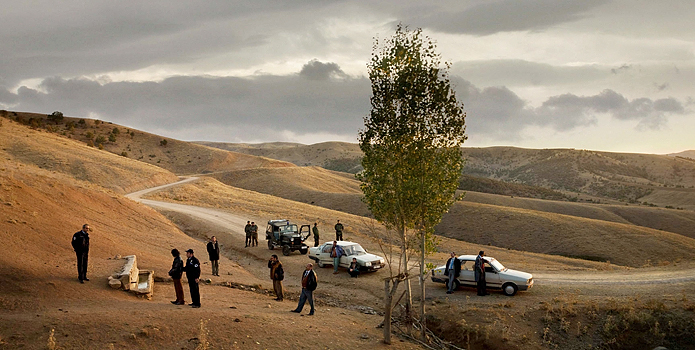I hate “Law and Order.” I hate how identical it feels week to week with its dense, ridiculous plots and minimal visual intrigue. It’s almost completely soiled me on crime procedurals.
But Turkish director Nuri Bilge Ceylan has made a peculiar crime procedural by oddly making “Once Upon a Time in Anatolia’s” story more mundane and its artistry more remarkable.
It’s the story of a group of detectives out searching for a body after two men have confessed to a murder. They were drunk when they committed the act and can’t remember where the body is buried, so their search for it is intentionally slow and arduous.
But the entire time Ceylan transports us to another world full of darkly captivating natural splendor. The long, winding roads through the hilly Turkish countryside are painterly tapestries in the camera’s eyes, and Ceylan slowly glosses over them in deliberately expressive shots. So often he challenges us to scour the lush landscape, and we become enchanted by the subtle motion of cars rocketing like fireballs as they gracefully penetrate the image.
Even on the ground with the cops, the film is strikingly economical and mystifying. One shot gives a full view of a cramped car and the people inside it. The cops have a boring, idiotic conversation not relevant to the plot, and the camera gradually zooms in on the deeply focused and irritated prisoner, Kenan (Firat Tanis). The whole first act maintains this deep intensity.
Many of the images suggest for these people a sort of worldly insignificance. An apple tumbles endlessly into a stream to represent their frustrations at being unable to locate the body. A local girl during a quiet meal overwhelms them with her radiant beauty, and the search and the details about finding the body grow increasingly pointless.
In its latter half, “Once Upon a Time in Anatolia” does lose its mystique as the detectives end their search and return home, the details of the case, presented in what seem like an eternity, feel like minutia amidst the film’s broader themes.
And yet Ceylan’s screenplay is clever about making its plot nuggets into more than just parables. One character, Prosecutor Nusret (Taner Birsel), recalls the death of a woman to Doctor Cemal (Muhammet Uzuner) to ask him what could’ve caused such a mysterious and sudden death. His words strike us as nothing more than metaphors and character development, and the subtle way in which the slightest word reveals an immense revelation by the film’s end is powerful.
In this way, Ceylan’s “Once Upon a Time in Anatolia” is a challenging, slow and dense crime procedural with more than a few moments that simply mystify.
3 stars
